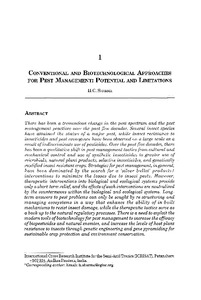Conventional and Biotechnological approaches for Pest Management: Potential and Limitations
Abstract
There has been a tremendous change in the pest spectrum and the pest management practices over the past five decades. Several insect species have attained the status of a major pest, while insect resistance to insecticid,es and pest resurgence have been observed on a large scale as a result of indiscriminate use of pesticides. Over the past five decades, there has been a qualitative shift in pest management tactics from cultural and mechanical control and use of synthetic insecticides to greater use of microbials, natural plant products, selective insecticides, and genetically modified insect-resistant crops. Strategies for pest management, in general, have been dominated by the search for a 'silver bullet' products / interventions to minimize the losses due to insect pests. However, therapeutic interventions into biological and ecological systems provide only a short-term relief, and the effects of such interventions are neutralized by the countermoves within the biological and ecological systems. Longterm answers to pest problems can on(y be sought by re-structuring and managing ecosystems in a way that enhance the ability of in-built mechanisms to resist insect damage, while the therapeutic tactics serve as a back up to the natural regulatory processes. There is a need to exploit the modern tools ofbiotechnology for pest management to increase the efficacy of biopesticides and natural enemies, and increase the levels of host plant resistance to insects through genetic engineering and gene pyramiding for sustainable crop protection and environment conservation

